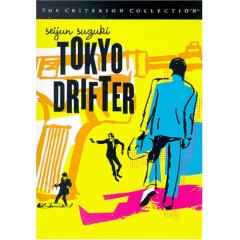
Over the past few weeks, I've watched the Samurai trilogy starring Toshiro Mifune with my wife. I had seen the first movie in film class and really enjoyed the great use of color and cinematography to tell this epic story. In many ways, this series is the ultimate Toshiro Mifune movie in that it demonstrates the type of character he excelled at: the wild man with grandiose aspirations transforming into the ultimate Japanese warrior. A large group of recurring characters keeps the story going and viewer interest up as Mifune's character goes on his journey.
The first movie centers on Mifune talking his friend into leaving town with him to try to become samurai. The friend leaves his fiancee' behind, Otsu, to take the trip. They end up taking refuge with a scheming widow and her daughter until brigands attack. Mifune's friend leaves with the scheming pair while Mifune is arrested for the assumed murder of his friend.
The local monk begins his training of Mifune from unfocused ruffian to trained samurai. In the meantime, Mifune and Otsu fall in love as Otsu devotes her life to following him (and its a long trip, trust me).
By the end of the first movie, Mifune leaves Otsu to hit the road and learn the ways of the force, er, samurai. The second movie centers on Mifune challenging other swordsmen and his continued development from undisciplined killer to controlled killer. There is a fantastic fight at the end where he takes on like 80 swordsmen and kicks ass through skill, power and strategy.
Otsu continues to follow him and other women throw themselves at him left and right. But he won't have anything to do with women because he's thinking of Otsu and then he blows it with her by practically attacking her. Otsu cries about it and Mifune renounces women! And what's funny is they write it in big letters on the screen as if this is a proud decision. Japan is known for being a little sexist but that's pretty extreme. Fortunately for Mifune, Otsu spends the next movie still following him around.
The third movie is Mifune learning the best fights are the ones he doesn't need to do and feeling bad about assaulting Otsu. A young upstart wants to make his name by killing Mifune. There is a climactic fight on the beach which is filled with tension and feeling. It's great stuff, though it's interesting to see another culture's concept of machismo. The trilogy ends with Mifune having killed like 100 people but he's still a virgin. On top of that, he seems like a sad virgin. But he is a samurai! A focused honorable killing machine that's not gettin' any.
My only negative comment is that the TV version of these movies were made from really scratchy and washed out prints. Everything seemed faded and soft focus, not at all like the way I remembered it 20 years ago. I hope the DVD's aren't as bad. The sexism is dated and humorous, my favorite part is where Mifune tries to break up with Otsu by saying "I prefer my sword to you." If that's not a loaded statement, I don't know what is. Yeah, sharpen that sword Mifune!
I actually really liked these movies and enjoyed the evolution of Mifune's character. The photography is fantastic, the characters are well drawn and realistic and the story immerses you in its ideas of code and honor. I highly recommend viewing these films.
Another story of growing up is at Number 71:
Counting Crows - August And Everything After (1993)
When I think of all the whiny classic rockers in alt rock wrapping, the first band I think of is Counting Crows. They look 90's and talk 90's but play like Jackson Browne's backing band with restrained guitars and blasts of organ. Singer Adam Durwitz mumbles and mopes with the weight of the world on his shoulders, walking a fine line between genuine expression and affectation. It sounds bad (and my wife would say is bad, she HATES this group), but it all works for me.
The main hit, the Van Morrisonish "Mr. Jones" is one of the big highlights on the album. It's also the only happy song on the album, practically a "Brown Eyed Girl" for the nineties. There are a handful of other uptempo numbers, mainly "Rain Kings" and "A Murder Of One" which find the group striking the balance between heavy concern and jubilation.
Mostly, the album is filled with ballads. The best ballad, the hit "Round Here", brings the Counting Crows sound into focus. A slow beat, churchy organ and sparkling guitars frame Durwitz's weary vocal and evocation of new found worldliness. Remember when you were 19 and going to a different town seemed like discovering a new universe? How grown up it made you feel? Counting Crows nails that feeling. "Anna Begins", "Time And Time Again" and the other songs are infused with the same sense of revelation.
Despite the borrowed early 70's influences (Van Morrison, The Band, Bob Dylan) Counting Crows manage to come up with an inspired debut that is both modern and classic. And no, I don't think "Mr Jones" is a code name for a sexual organ. It does make the song funnier, though. Sha la la la indeed!






